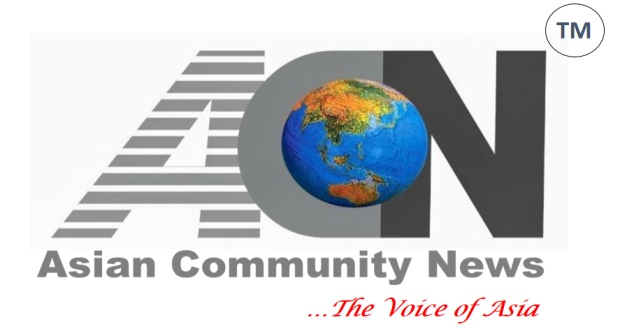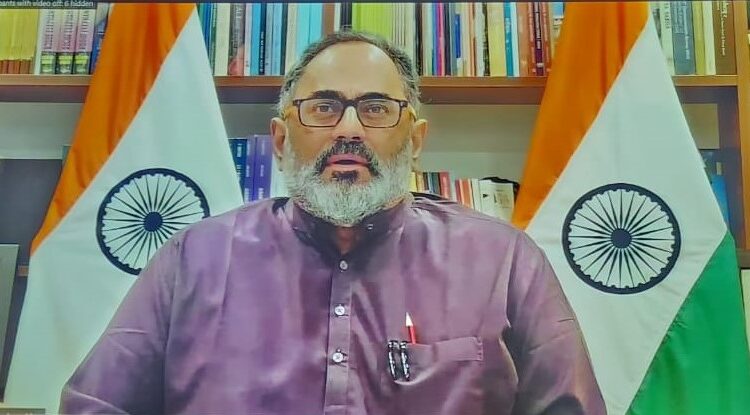Skill Facilitation Cell set up at Indian Embassy in Tokyo to push India-Japan skill connect
The Embassy of India aims to hold regular Skill Development focused events all across Japan to generate momentum in the areas of India-Japan Skill Connect.
TOKYO: In an effort to push India-Japan skill connect and create an ecosystem in Japan to put in place a framework and mechanism to send high number of Indian skilled youths to Japan, the Indian embassy in Tokyo has set up Skill Facilitation Cell at its premises. The cell would not only generate awareness among the Japanese corporate sector about the immense potential of human resource India posses but also facilitate the exchanges to push skill development initiatives – TITP and SSW.
Rajeev Chandrasekhar, Union Minister of State for Skill Development and Entrepreneurship and Electronics and Information Technology, announced the formal launch of “Skill Facilitation Cell” while participating virtually in the ‘India-Japan Skill Connect’ conference (インド日本スキルコネクト会議) held at the Indian embassy in Tokyo on Friday. The event witnessed high level Ministerial participation – Shunsuke Takei, Minister of State for Foreign Affairs, Shogo Azemoto, Parliamentary Vice-Minister, Ministry of Health, Labour and Welfare and Yasuhiro Takami, Parliamentary Vice-Minister, Ministry of Justice addressed the gathering. The conference also saw participation from 159 Japan-based companies from sectors such as consulting, IT, HR, manufacturing etc.
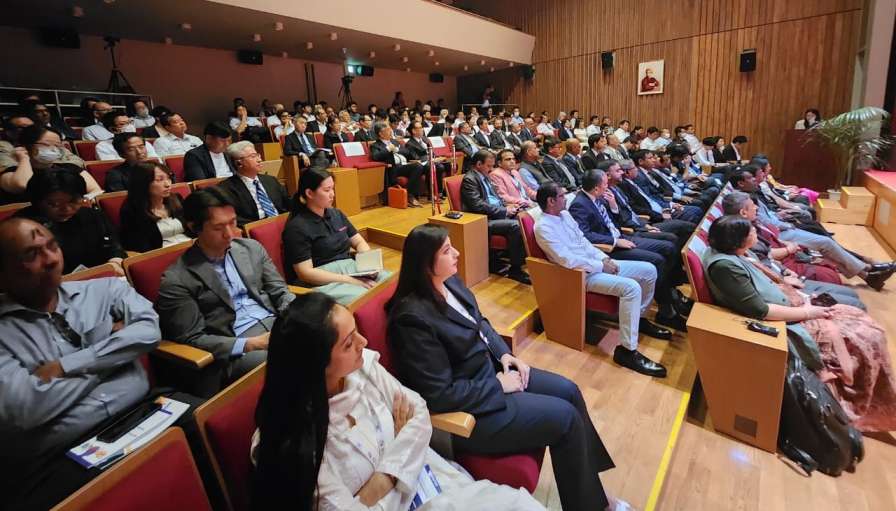
Skill Facilitation Cell would support Japanese businesses interested in hiring skilled and semi-skilled workers from India, and it will a First Point of Contact for Japanese Supervising Organizations for seamless skill connect with India. It will be working in tandem with both private and government organizations from India and Japan for a comprehensive match-making support
In his opening remarks, Sibi George, Ambassador of India to Japan, said that the embassy would be organinsing several events in Tokyo and various prefectures across japan to generate awareness and facilitate the exchanges about the huge potential India has on skilled manpower. He also called upon the Japanese government to enter into Migration and Mobility Partnership Agreement (MMPA) with India. “India has already inked MMPA with several countries including Germany, France, Portugal, UK and Denmark. It will help us to cooperate and expand our activities to meet the requirements of the global knowledge as India is a great source of human resources,” Ambassador George added while underlining the ‘’Special Strategic and Global Partnership’’ between India and Japan and called for deepening synergies in the field of skill development and transfer of talented human resources from India to Japan to cater to the demands of the Japanese industries and businesses.
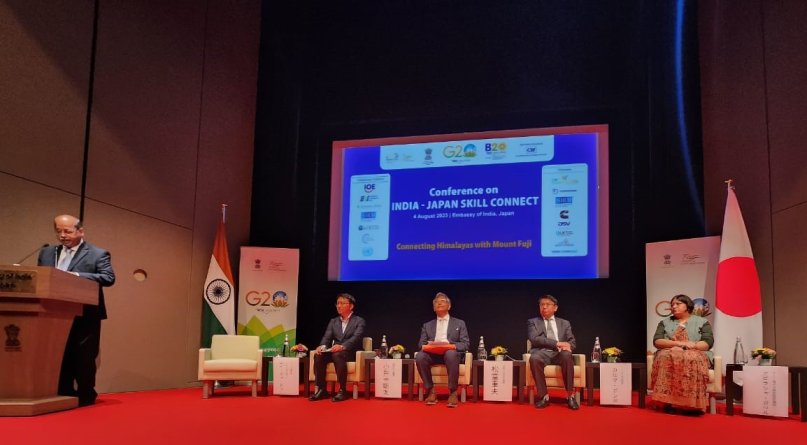 Also present on the occasion were JICA and JITCO representatives, a 25-member CII skill delegation comprising of the Sikkim government officials, representatives from recruiting agencies and companies in the area of skill development and human resources based in India and Japan.
Also present on the occasion were JICA and JITCO representatives, a 25-member CII skill delegation comprising of the Sikkim government officials, representatives from recruiting agencies and companies in the area of skill development and human resources based in India and Japan.
In his address Shunsuke Takei, Minister of State for Foreign Affairs of Japan mentioned that there was a strong potential in promoting exchanges between India and Japan through ‘’Specified Skilled Worker’’ (SSW) route. Shogo Azemoto, Parliamentary Vice-Minister, Ministry of Health, Labour and Welfare spoke on the necessity of promoting people-to-people contacts on the strength of increased labour mobility. Yasuhiro Takami, Parliamentary Vice-Minister, Ministry of Justice appreciated that India’s highly skilled professionals were contributing significantly to the Japanese economy.
Functions of Skill Facilitation Cell
To support Japanese businesses interested in hiring skilled and semi-skilled workers from India
First Point of Contact for Japanese Supervising Organizations for seamless skill connect with India
Working in tandem with both private and government organizations from India and Japan for a comprehensive match-making support
In his Keynote address Rajeev Chandrasekhar, Union Minister of State for Skill Development and Entrepreneurship and Electronics and Information Technology, Government of India, underlined India’s Prime Minister Narendra Modi’s vision to make the Indian workforce future-ready and enabled. He expressed his satisfaction on the opening of nine more sectors under the SSW and called for creating dedicated skill training hubs in India for Japanese industry, which could impart the necessary Japanese industry specific skill-sets, language ability and certification so that it creates a win-win situation for both sides.
In his concluding remarks, Sheetal M Kulkarni, Leader of the CII delegation and Vice President, Blue Star International Limited focused on the attributes of Skill India Mission, which is aligned with the ‘Future of Work’.
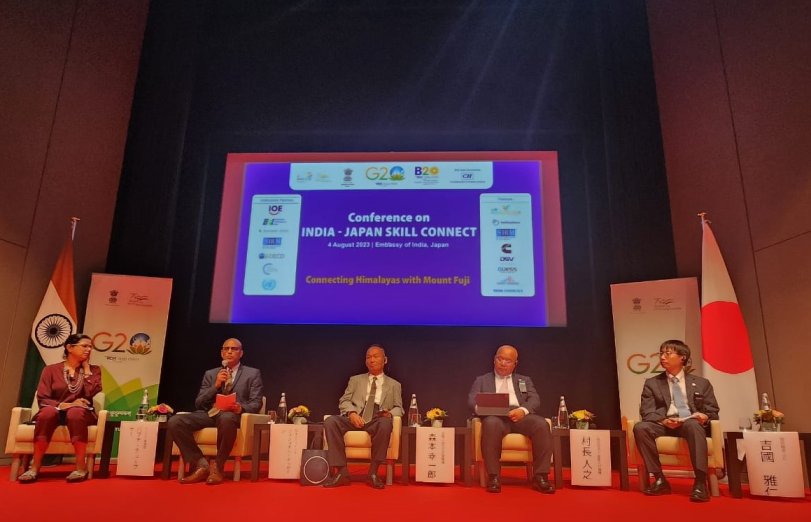 Karma R. Bonpo, Secretary, Department of Commerce & Industries Government of Sikkim who led the CII delegation through Korea and Japan, said that the Government of Sikkim also realised the strong possibility of sending its young labour force to developed economies like Japan to not only improve on their technical skills but also gain meaningful employment. “The youth of the Sikkim are aspirational and aspire for better jobs and growth opportunities and Japan can be an important destination for their career development,” he added.
Karma R. Bonpo, Secretary, Department of Commerce & Industries Government of Sikkim who led the CII delegation through Korea and Japan, said that the Government of Sikkim also realised the strong possibility of sending its young labour force to developed economies like Japan to not only improve on their technical skills but also gain meaningful employment. “The youth of the Sikkim are aspirational and aspire for better jobs and growth opportunities and Japan can be an important destination for their career development,” he added.
Two panel discussions focused on topics ‘Japan-India Skill Connect-bolstering bilateral collaboration’ moderated by Sougata Roy Choudhury Executive Director, Confederation of Indian Industry (CII) and ‘Mobility Pathways- opportunity, challenges and way head’ moderated by Ms Bhavna Chopra Srikrishna, General Manager, & Head – Skill development & Livelihood, Confederation of Indian Industry (CII) respectively, deliberated on how to re-invigorate the sectoral cooperation and the opportunities and challenges underlying them.
Indian high skilled workforce numbers have significantly increased in Japan to over 12,500 forming a quarter of total Indian Diaspora. There has also been a growing engagement under the TITP and SSW routes for movement of Indian workforce to the country. It is estimated that there are more than 300 Japanese language training institutes in India.
